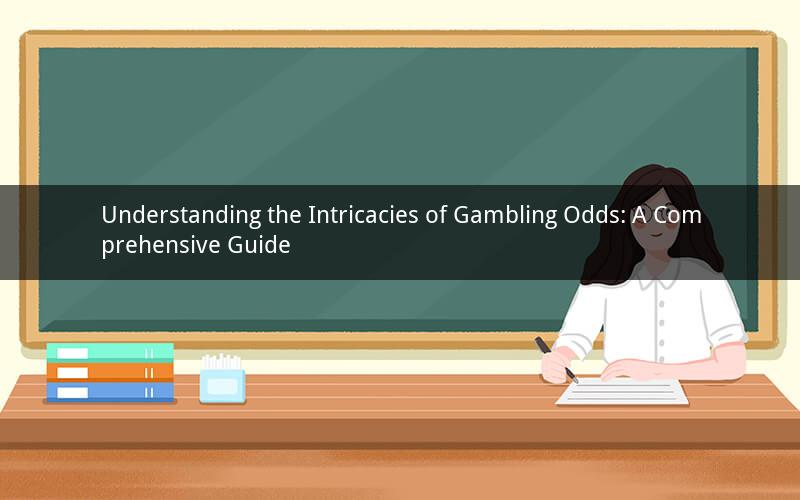
In the world of gambling, odds are an essential component that determines the likelihood of an event occurring. Whether you are a seasoned bettor or a beginner, understanding how gambling odds work is crucial for making informed decisions and maximizing your chances of winning. This article delves into the details of gambling odds, providing an in-depth understanding of how they are calculated and utilized in different gambling scenarios.
I. The Basics of Gambling Odds
Gambling odds are numerical representations that indicate the likelihood of an event happening. They are typically expressed in three different formats: fractional, decimal, and American. Each format has its unique characteristics and applications, but they all convey the same fundamental information.
A. Fractional Odds
Fractional odds are the most traditional form of gambling odds. They are presented as a ratio of the potential profit to the stake. For example, if you see odds of 3/1, it means that for every dollar you bet, you can win three dollars in profit, assuming the bet is successful.
B. Decimal Odds
Decimal odds are the most common format used worldwide. They represent the total amount that will be returned to the bettor, including the original stake. For instance, odds of 3.00 on a particular outcome imply that for every dollar wagered, the bettor will receive $3.00 in total, which includes the $1.00 stake.
C. American Odds
American odds are expressed in a positive or negative format. Positive odds indicate the potential profit on a $100 stake, while negative odds represent the amount that must be wagered to win $100. For example, +200 odds mean that a $100 bet will yield a $200 profit, whereas -200 odds mean a $200 bet is required to win $100.
II. Calculating Gambling Odds
The calculation of gambling odds is based on the probability of an event occurring. Bookmakers use complex mathematical formulas to determine the odds for various outcomes in sports betting, casino games, and other forms of gambling. Here's a brief overview of the process:
A. Probability
Probability is the likelihood of an event occurring, expressed as a fraction or percentage. It is calculated by dividing the number of favorable outcomes by the total number of possible outcomes. For example, if there are three possible outcomes and only one of them is favorable, the probability is 1/3 or approximately 33.33%.
B. Implied Probability
Implied probability is the probability derived from the odds. To calculate it, divide the numerator of the fractional odds by the sum of the numerator and denominator. For decimal odds, divide 1 by the decimal value. For American odds, divide 100 by the absolute value of the odds.
C. Odds Conversion
To convert odds from one format to another, use the following formulas:
- Fractional to Decimal: (Numerator / Denominator) + 1
- Decimal to Fractional: (Decimal - 1) Denominator / Numerator
- Fractional to American: (Numerator / Denominator) - 1
- Decimal to American: 100 / Decimal - 1
- American to Fractional: (Absolute Value of Odds + 1) Denominator / Numerator
- American to Decimal: (Absolute Value of Odds + 1) / (Absolute Value of Odds + 1)
III. Utilizing Gambling Odds
Understanding gambling odds is essential for making informed betting decisions. Here are some tips on how to use odds effectively:
A. Compare Odds
Before placing a bet, compare the odds offered by different bookmakers or casinos. Higher odds often mean better value for your bets.
B. Calculate Potential Profits
Use the odds to calculate potential profits and losses. This can help you determine how much you should wager to achieve your desired profit level.
C. Consider Implied Probability
When evaluating a bet, consider the implied probability derived from the odds. If the implied probability is higher than the actual probability, the bet may be undervalued and worth considering.
D. Stay Informed
Stay up-to-date with the latest news, statistics, and trends in the sport or game you are betting on. This information can help you make more informed decisions based on the odds.
IV. Conclusion
Understanding how gambling odds work is crucial for anyone interested in placing bets or playing casino games. By familiarizing yourself with the different formats, calculating probabilities, and utilizing odds effectively, you can enhance your chances of winning and make more informed decisions.
Now, let's explore some frequently asked questions regarding gambling odds:
1. What is the difference between implied probability and actual probability?
Answer: Implied probability is the probability derived from the odds, while actual probability is the true likelihood of an event occurring. Bookmakers often set odds that slightly favor them, resulting in implied probabilities that are higher than the actual probabilities.
2. How do bookmakers determine gambling odds?
Answer: Bookmakers use a combination of historical data, expert analysis, and mathematical models to determine gambling odds. They aim to set odds that will result in a profit over time, while still offering value to bettors.
3. Can I make money by betting on favorites?
Answer: Yes, it is possible to make money betting on favorites, but it is generally more challenging. Bookmakers often set higher odds on favorites to offset the increased likelihood of them winning.
4. What is the difference between moneyline and spread betting in sports betting?
Answer: Moneyline betting involves simply picking the winner of a game or event, while spread betting involves predicting the margin of victory or defeat. Spread betting allows for more balanced betting opportunities between favorites and underdogs.
5. Can I use gambling odds to predict the outcome of a game or event?
Answer: While gambling odds can provide insights into the likelihood of an event occurring, they are not a foolproof method for predicting outcomes. Other factors, such as player performance, team dynamics, and external circumstances, can also influence the outcome of a game or event.